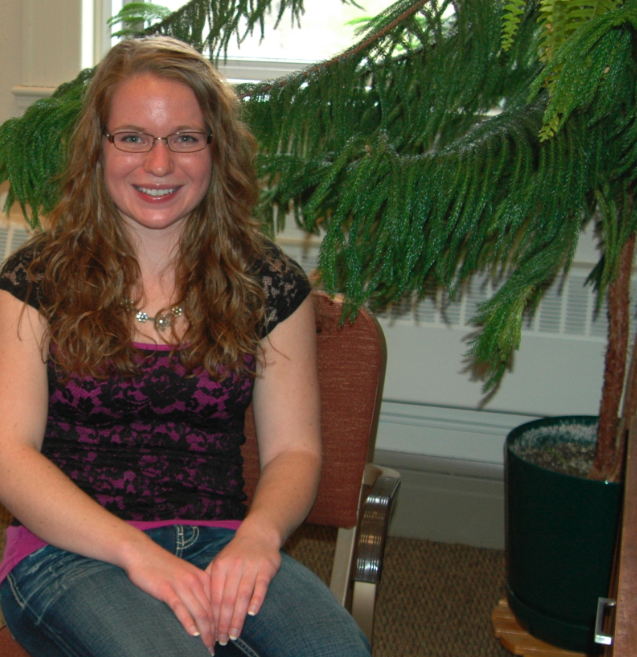
How do you make sure a newly designed undergraduate curriculum for your most-popular course will work and meet its objectives? You have your super undergraduate TA take a look at it.
That strategy worked for the Department of Chemistry who called on “Super TA” Emily Bruggeman to write Powerpoints and teaching aids for newly overhauled Chemistry 109.
Bruggeman, who graduated in December with a chemistry degree, has her eyes on a physician’s assistant degree. But she has been an undergraduate teaching assistant since her junior year and has loved every minute of it.
The faculty recognized her extraordinary teaching ability and they tapped her to help write the new materials critical to teaching in the new labs. She worked with pilot sections this year, working with materials sent by associate professor of practice Eric Malina. Because the current labs lack video monitors, the students were working from handouts rather than Powerpoints.
The old chem labs lacked charm. There was no whiteboard space, no microphones, no work space (read more about the new chemistry labs at http://scarlet.unl.edu/?p=10522). The new labs will allow the TAs to put information on overhead monitors so the entire class can see at once what it used to take multiple times to explain.
But the new labs also required someone to put that documentation together, since it had never existed before. Bruggeman was the obvious choice, Malina said.
Bruggeman was flattered, and although it’s been a lot of work, she finds it rewarding.
“I knew the material from the old labs and I could anticipate the questions and where students would have a hard time. With the pilot courses, I was learning along with the students where the bumps would be.”
After each class, she highlighted where the students had trouble and suggested ways faculty could tweak lessons for clarity; then she put the Powerpoints together. She plans to review them at semester’s end before she considers the project finished.
Bruggeman is a meticulous planner and good teacher.
“If you TA right, there’s a lot of preparation work. I take the first 20 minutes of my labs to explain why they are learning how to do the experiment. I want to give the students some guidance and direction. It makes it more relevant. And being pretty explicit cuts down on the frantic emails I get from students.”
Bruggeman said some keys to her success as a TA include learning her students’ names by the second week of lab, making her labs inviting, and trying to learn about each student so she could understand not only their chemistry experience but why they were taking the course.
She also required written lab reports and is especially interested in students’ understanding why an experiment failed or went awry.
“Science doesn’t always go ideally,” she said. “I want them to think about what they did, and what they would change the next time to get a different outcome.”
She sees connections between being a TA and a physician's assistant. “I think I am a good TA, but my heart is really stuck on being a pediatric PA,” she said.
“It’s about helping people and making a situation the best it can be. TA was very much a part of my UNL career. Chemistry is my way of getting to where I want to be. I think if it were just me and the test tubes, I’d be struggling. I need that people factor to be happy.”
She will miss the experience, however.
“In the new labs, those TAs will be really spoiled. They are going to be awesome teaching spaces.”
Is she tempted to come back next semester? Not really.
Bruggeman is taking an accelerated course to earn a “certified nursing assistant” license so she can work with patients before entering physician’s assistant school next summer. She has applied to three programs but will not learn where she has been accepted until February.
— Kim Hachiya, University Communications
More details at: http://go.unl.edu/fdo